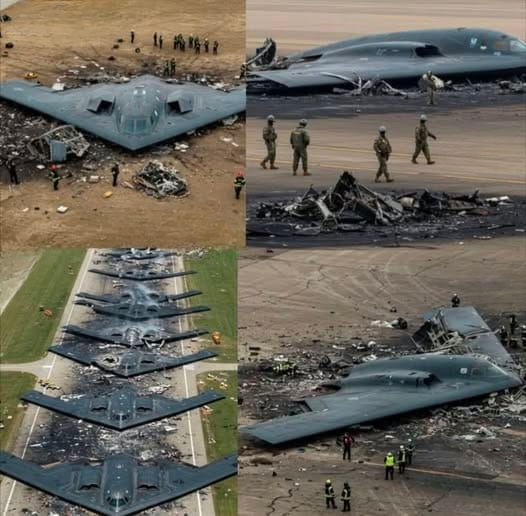In the shadowed corridors of global intelligence and military command, a single story has quietly set off alarms worldwide: a high-risk, precision operation reportedly carried out by U.S. B-2 Spirit bombers deep inside Iranian airspace. If confirmed, it would mark one of the boldest displays of American airpower in decades — and a stark signal that the delicate balance of Middle Eastern deterrence may be shifting once again.
The first hints were subtle: intercepted communications, unexplained radar blips, satellite anomalies over central Iran. Within days, defense analysts across continents were drawing the same conclusion: something extraordinary had occurred above one of the most heavily defended regions on Earth.
At the heart of the speculation stands the B-2 Spirit, America’s stealth bomber and the crown jewel of its strategic arsenal. Engineered to slip through the densest radar networks, the B-2 carries the U.S. military’s most formidable conventional weapon: the GBU-57 Massive Ordnance Penetrator. If the reports are true, those bunker-busting behemoths may have finally met their target.
A Mission from Missouri
The alleged operation began at Whiteman Air Force Base, Missouri, the only home of the B-2 fleet. Under cover of night, a formation of bombers reportedly took off, embarking on a 13,000-kilometer flight across the Atlantic, the Mediterranean, and into the Middle East.
Fueled by multiple mid-air refuelings, pilots spent nearly 24 hours in the air — maintaining strict radio silence and navigating toward a single, critical objective: Iran’s underground nuclear facility at Fordow, buried deep beneath a mountain near Qom and long thought invulnerable to any known conventional weapon.
The Weapon for the Unreachable
Each B-2 can carry two GBU-57 bombs — 13.6-ton penetrators capable of piercing up to 60 meters of reinforced concrete and rock before detonating their 2.4-ton warheads. No other weapon on Earth can reach such deeply buried targets. These bombs aren’t symbols; they are tools designed to annihilate what was considered untouchable.
For military planners, deploying them — or hinting at their deployment — serves a dual purpose: demonstrating the U.S.’s global reach and reminding adversaries that no fortress is safe.
Stealth as Strategy
The B-2’s true power lies in its invisibility. Its flying-wing design and radar-absorbent skin make it nearly undetectable, even to Iran’s sophisticated Russian-supplied radar networks. Operators watching screens that night may have seen only flickers, until explosions confirmed the bomber’s presence.
Yet stealth comes with limits. Each plane carries just two bunker-busters, meaning every strike must be perfect. The doctrine of the B-2 emphasizes precision over quantity, silence over spectacle.
The Global Ripple
For Tehran, the implications are staggering. A successful incursion would expose vulnerabilities long denied by Iranian officials. Satellite imagery and unusual activity near Fordow have already spurred speculation.
In Washington, the operation — real or rumored — sends an unmistakable message: the U.S. possesses both the means and the resolve to neutralize threats preemptively. Analysts suggest the mission may have been as much psychological as tactical — a silent reminder that America can reach targets without warning.
Deterrence or Provocation?
The B-2’s presence blurs the line between deterrence and escalation. While it reinforces U.S. dominance, it risks pushing Tehran toward further militarization, closer cooperation with Russia and China, and accelerated anti-stealth measures. The next chapter of global competition may revolve less around missiles and tanks, and more around radar and invisibility.
A Philosophy of War
Whether a live strike, a rehearsal, or a calculated deception, the operation embodies U.S. military philosophy: surgical strikes, psychological impact, and dominance through invisibility. The B-2 demonstrates that in modern warfare, success belongs not to the loudest or largest, but to the unseen.
The Takeaway
What actually happened over Iran that night may never be confirmed. But the message is clear: in the twenty-first century, there is no true sanctuary. The age of hiding is over.
